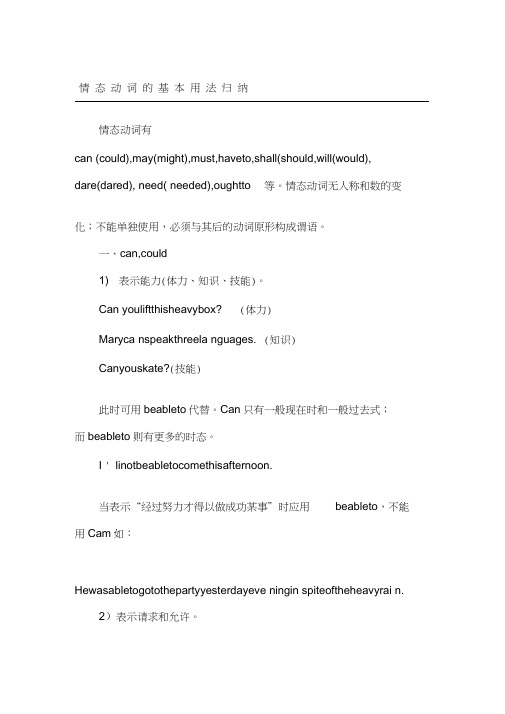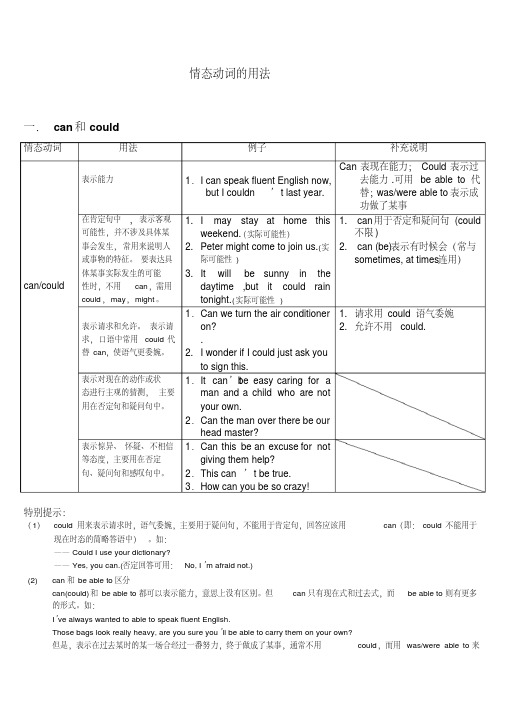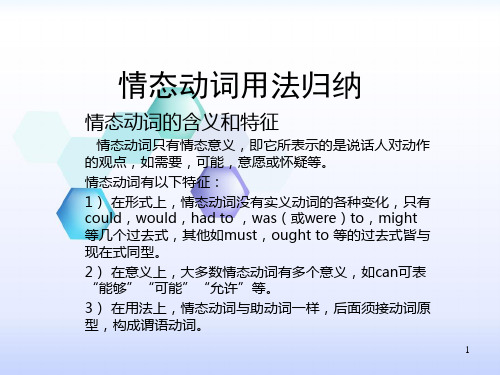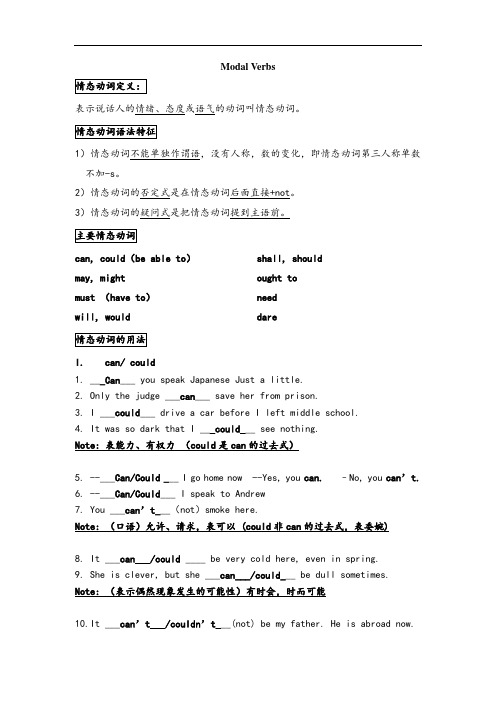情态动词用法归纳(全)资料讲解共62页
情态动词用法归纳(全)PPT教学课件

2) must是说话人的主观看法, 而have to则强调客观需要。 Must只有一般现在时, have to 有更多的时态形式。 1. I really must go now. 2. I had to work when I was your age.
7
三、 must, have to
3) 表示推测、可能性(只用于肯定的陈述句)
9
四、 dare, need
3) dare和 need作实义动词用时, 有人称、时态和数的变化。 在肯定句中,dare后面常接带to的不定式。在疑问句和否 定句中,dare后面可接带to或不带to的不定式。而need后 面只能接带to的不定式。 1. I dare to swim across this river.
1. How dare you say I’m unfair? 2. He daren’t speak English before such a crowd, dare he? 3. If we dared not go there that day, we couldn’t get the beautiful flowers.
2
一、 can, could
2) 表示请求和允许。 -----Can I go now? ----- Yes, you can. / No, you can’t. 此时可与may互换。在疑问句中还可用could, might代替,不是过去式,只是语气更委婉,不能用于肯定 句和答语中。
---- Could I come to see you tomorrow? ---- Yes, you can. ( No, I’m afraid not. )
2) need 作情态动词用时, 常用于疑问句、否定句。在肯定句 中一般用must, have to, ought to, should代替。
(完整版)初中英语情态动词用法大全,推荐文档

情态动词用法总结can 表示能力,意为“能会” 表示推测,意为“可能”,常用于否定句和疑问句中表示请求,允许,意为“可以”could can 的过去式,意为“能、会”,表示过去的能力在疑问句中表示委婉请求may 表示请求、许可,意为“可以” 表示推测,常用于肯定句中,意为“可能、也许”might may 的过去式表示推测,常用于肯定句中,意为“可能、也许must 表示主观看法,意为“必须、应该” 表示有把握的推测,用语肯定句need 表示需要、必须,主要用于否定句和疑问句中should 意为“应该”,表示要求和命令表示劝告、建议had better 意为“最好”,表示建议used to 意为“过去常常,表示过去的动作、行为知识梳理情态动词有具体的词义,但也同助动词一样,需要与其他词语一起构成句子的谓语,另外情态动词没有人称和数的变化,情态动词后必须跟动词原形。
考点一can ,may,must 等情态动词在陈述句中的用法1. can 的用法(1)表示能力、许可、可能性。
表示能力时一般译为“能、会”,即有种能力,尤其是生来具备的能力,此时may 和must 均不可代替它。
如:She can swim fast, but lean '她能游得很快,但我不能。
I can see with my eyes. 我用眼睛看。
(2)表示可能、能够。
如:l can finish it in an hour . 我能在一小时后完成它。
(3)表示许可,常在口语中。
如:You can use my dictionary. 你可以用我的字典。
(4)表示推测,意为可能” 常用于否定句和疑问句中,此时can'译为“不可能”女口:Can the news be true? 这个消息会是真的吗?--- C an it be our teacher?那个人有可能是我们老师吗?--- No , it can 't be outeracher. He is on a visit to the Great Wall. 不可能。
情态动词的基本用法归纳

情态动词的基本用法归纳情态动词有can (could),may(might),must,haveto,shall(should,will(would),dare(dared), need( needed),oughtto 等。
情态动词无人称和数的变化;不能单独使用,必须与其后的动词原形构成谓语。
一、can,could1) 表示能力(体力、知识、技能)。
Can youliftthisheavybox? (体力)Maryca nspeakthreela nguages. (知识)Canyouskate?(技能)此时可用beableto代替。
Can只有一般现在时和一般过去式;而beableto则有更多的时态。
I ' linotbeabletocomethisafternoon.当表示“经过努力才得以做成功某事”时应用beableto,不能用Cam如:Hewasabletogotothepartyyesterdayeve ningin spiteoftheheavyrai n.2)表示请求和允许。
情态动词的基本用法归纳---- Canlgonow?——Yes,youca n./No,y ouca n' t.此时可与may互换。
在疑问句中还可用could,might代替,不是过去式,只是语气更委婉,不能用于肯定句和答语中。
--- CouldIcometoseeyoutomorrow?--- Yes,youcan.(No,I 'mafraidnot.)3)表示客观可能性(客观原因形成的能力)。
They'vechangedthetimetable,sowecangobybusinstead.Thishallcanhold500peopleatleast.4)表示推测(惊讶、怀疑、不相信的态度),用于疑问句、否定句和感叹句中。
Canthisbetrue?Thiscan 'tbedonebyhim.Howcanthisbetrue?二、may,might1)表示请求和允许。
情态动词用法归纳(全)

They shouldn't have concealed it from us . 他们本不应该对我们隐瞒那件事。
当表示“经过努力才得以做成功某事”时应用be able to,不能用Can。如:
He was able to go to the party yesterday in spite of the heavy rain.
2)表示客观可能性(客观原因形成的能力)
eg. The moon can not always be at the full. 月不可能常圆 If it's raining tomorrow,the sports can take place indoors.
1. How dare you say I’m unfair? 2. He daren’t speak English before such a crowd, dare he? 3. If we dared not go there that day, we couldn’t get the beautiful
may(might)有以下几种形式:
时态 现在式 过去式
肯定式 may might
否定式 缩略否定式
may not
mayn't
might not mightn't
mቤተ መጻሕፍቲ ባይዱy(might)的基本用法:
1)表可能,暗含不确定,等于possibly,perhaps,maybe,如: He may be busy getting ready for his trip. 他也许在忙于准备外出旅游。
can 表可能时指现在或将来。如: You can perhaps obtain a dog from the Dog's home.
情态动词的用法完整详细

情态动词的用法完整详细情态动词定义:情态动词是一种本身有一定的词义,但要与动词原形一起使用,给谓语动词增添情态颜色,表示说话人对有关行为或事物的态度和看法,认为其可能、应当或须要等。
情态动词后面加动词原形。
分类:情态动词有四类:①只做情态动词:must,can(could),may(might),ought to①可做情态动词又可做实义动词:need,dare①可做情态动词又可做助动词:shall(should),will(would)①具有情态动词特征:have(had) to,used to位置:情态动词在句中放在谓语动词之前, 谓语动词前若有助动词,则在助动词之前,疑问句中, 情态动词则在主语之前。
I can see you. Come here.我能看见你,过来吧。
He must have been away.他一定走了。
What can I do for you?我能帮你吗?How dare you treat us like that!你怎能那样对待我们!特点:情态动词无人称和数的变化, 情态动词后面跟的动词需用原形,否定式构成是在情态动词后面加"not"。
个别情态动词有现在式和过去式两种形式, 过去式用来表达越发客气, 委婉的语气, 时态性不强, 可用于过去,现在或未来。
情态动词属非及物动词,故没有被动语态。
情态动词没有非谓语形式,即没有不定式,分词,等形式。
He could be here soon.他很快就来。
We can't carry the heavy box.我们搬不动那箱子。
I'm sorry I can't help you.对不起,我帮不上你。
基本助动词与情态助动词最主要的区分之一是,基本助动词本身没有词义,而情态助动词则有自己的词义,能表示说话人对有关动作或状态的看法,或表示主观设想:What have you been doing since? (构成完成举行体,本身无词义)I am afraid I must be going. (一定要)You may have read some account of the matter. (或许已经)除此之外,情态助动词还有如下词法和句法特征:1)除ought和used以外,其他情态动词后面只能接不带to的不定式。
最全情态动词的用法

情态动词的用法一.can和could情态动词用法例子补充说明can/could 表示能力1.I can speak fluent English now,but I couldn’t last year.Can表现在能力;Could表示过去能力.可用be able to代替;was/were able to 表示成功做了某事在肯定句中,表示客观可能性,并不涉及具体某事会发生,常用来说明人或事物的特征。
要表达具体某事实际发生的可能性时,不用can,需用could,may,might。
1.I may stay at home thisweekend.(实际可能性)2.Peter might come to join us.(实际可能性)3.It will be sunny in thedaytime ,but it could raintonight.(实际可能性)1. can用于否定和疑问句(could不限)2. can (be)表示有时候会(常与sometimes, at times 连用)表示请求和允许。
表示请求,口语中常用could代替can,使语气更委婉。
1.Can we turn the air conditioneron?.2.I wonder if I could just ask youto sign this.1.请求用could 语气委婉2.允许不用could.表示对现在的动作或状态进行主观的猜测,主要用在否定句和疑问句中。
1.It can’t be easy caring for aman and a child who are notyour own.2.Can the man over there be ourhead master?表示惊异、怀疑、不相信等态度,主要用在否定句、疑问句和感叹句中。
1.Can this be an excuse for notgiving them help?2.This can’t be true.3.How can you be so crazy!特别提示:(1)could用来表示请求时,语气委婉,主要用于疑问句,不能用于肯定句,回答应该用can(即:could不能用于现在时态的简略答语中)。
情态动词用法归纳(全)PPT教学课件

如果天不那么黑,你可能从这儿望见它的。(实际上已望不见)
4
3)表示请求和允许.
eg. You can borrow my bike tomorrow 明天你可以借用我的自行车
表这个意义时,can 用于疑问句时表要求,用于否定句时表不许,如:
Can you lend me a hand ?
This sort of thing can't go on!
1
• 一: can (could)的形式和用法 时态 现在时 过去式 肯定式 can could 否定式 cannot could not 缩略否定式 can't couldn't
2
一、 can, could
1) 表示能力(体力、知识、技能)。
Can you lift this heavy box?(体力)
情态动词用法归纳
情态动词的含义和特征
情态动词只有情态意义,即它所表示的是说话人对动作 的观点,如需要,可能,意愿或怀疑等。 情态动词有以下特征: 1) 在形式上,情态动词没有实义动词的各种变化,只有 could,would,had to ,was(或were)to,might 等几个过去式,其他如must,ought to 等的过去式皆与 现在式同型。 2) 在意义上,大多数情态动词有多个意义,如can可表 “能够”“可能”“允许”等。 3) 在用法上,情态动词与助动词一样,后面须接动an speak three languages.(知识)
Can you skate?(技能) 备注:此时可用be able to代替。Can只有一般现在时和一般过 去式;而be able to则有更多的时态。 eg: I’ll not be able to come this afternoon.
情态动词(讲解版)

Modal Verbs表示说话人的情绪、态度或语气的动词叫情态动词。
1)情态动词不能单独作谓语,没有人称,数的变化,即情态动词第三人称单数不加-s。
2)情态动词的否定式是在情态动词后面直接+not。
3)情态动词的疑问式是把情态动词提到主语前。
can, could(be able to)may, mightmust (have to)will, would shall, should ought to needdareI.can/ could1.___Can___ you speak Japanese Just a little.2.Only the judge ___can___ save her from prison.3.I ___could___ drive a car before I left middle school.4.It was so dark that I ___could___ see nothing.Note: 表能力、有权力(could是can的过去式)5.--___Can/Could ___ I go home now --Yes, you can.–No, you can’t.6.--___Can/Could___ I speak to Andrew7.You ___can’t___(not)smoke here.Note: (口语)允许、请求,表可以 (could非can的过去式,表委婉)8.It ___can___/could ____ be very cold here, even in spring.9.She is clever, but she ___can___/could___ be dull sometimes. Note: (表示偶然现象发生的可能性)有时会,时而可能10.It ___can’t___/couldn’t___(not) be my father. He is abroad now.11.There is someone outside. Who ___can___ it be12.You __can’t/couldn’t have seen him__ (not see) him. He was not there.13.She __ can’t/couldn’t have been ___(not be) more than six then.14.He __ can’t/couldn’t have finished___ (not finish) the work lastnight without your help.Note: 表推测(否定、疑问句)15.He __could have told__(tell) me the answer but he refused to. Note: 过去本能做而没有做16.You _cannot/ can never_________ do the work too well.17.You _cannot /can never__ be careful enough in your study.Note: cannot…too; can never... too; cannot enough再…都不为过;越…越好can & be able to区别:1. can 只有两种时态现在时can & 过去时 couldbe able to 有各种时态2. 用于一般所具有的能力,可以互换,但是当表示成功做到时,通常用be able to或manage to1.He _can/is able to_ write music.2.We shall __be able to__ finish the work soon.3.I haven’t_been able to_ find the book.4.He _could/was able to__ swim like a fish when he was young.5.I talked with her for a long time and finally I __was able to_ makeher believe me.6.The fire spread through the building quickly but everybody ___was ableto /managed___ to escape.II.may/might1.--__May___ I leave now--Yes, you __may__./Yes,please.--No, you __may not /can’t/mustn’t___.2. He asked if he _might_____ use the phone.3. We start early so that we _may/might___ arrive in time.Note: (允许、请求)可以4. __May__ you be happy all your life.Note: 祝、愿5. John is absent. He __may/might_____ be ill.6. It _may/might______ rain tomorrow or it __may/might_____ be merely cloudy.7. I can’t find my book. I _may/might have left___(leave) it in your office just now.8. You know this story very well. You _may/might have read___(read) it before.Note: 表推测9. We start early so that we ___may ___ arrive in time.10. I wrote down his telephone number so that I ___might___ remember it. Note: 表目的(用于目的状语从句中)maybe & may be11. He ___may be ___ here. I’m not sure.12. ____Maybe______ you should call him.13. –Are you going out tonight-- ____Maybe____.III.must1.You __must___ have a passport if you want to go abroad.2.Drivers __mustn’t___ drive after drinking.Note: (义务、责任、强制、命令)必须应该3.You _must_______ first finish your homework before you watch TV.4.--_Must________ I come tomorrow--Yes, you __must____.--No, you __needn’t/ don’t have to_____.Note: (说话者主观上的意愿、建议、命令等)应该、必须、务必5.Winter __must___ be followed by spring.6.All living things ___must___ die.Note: 表示客观规律不可避免性或必然性,注定要,必然(只用于肯定句)7.You __must___ be ill. I can see it from your face.8.You __must have read___(read) the book. You know the story very well.9.There’s much noise from next door. They __must be having__(have) aparty.Note: 表肯定推测Must & have to区别:1. have to 用于各种时态,还可和其它情态动词连用2. have to 表示因客观环境的迫使而不得不做某事1.-- Let’s see a movie tonight.--I’d love to, but I __have to____ take care of my mom.2. They __had to__ speed up, for the weather turned terrible.3. They will ___have to ___ get up early tomorrow.4. We may ___have to___ put off the plan.5. You ___don’t have to ___ tell him about it.不一定要6. You ___mustn’t ___ tell him about it. 一定不要IV.shall1.I __shall________ ring you as soon as I arrive.Note:将来时(第一人称)将要、会2.__Shall______ I open the window for you3.Let’s go to the cinema tonight, __shall___weNote: (在问句中表示说话人征求对方意见或提出建议,用于第一、三人称)…好么V. should & ought to1.We hoped that we __should______ be able to do that.Note: 用于过去将来时2.You _should/ought to____ be more careful next time.3._Should____ I call him and apologizeNote: (表示建议、劝告、命令、要求) 应该,必须(ought to 语气强)4.It’s 4:30. They __should______ be in New York by now.Note: (表示说话者根据一定的依据猜测、推测、推论等)该,可能5.You _should have told__(tell) me earlier about it, but you didn’t.6.You __shouldn’t have done_________ (do) that to your mother, but youdid.Note: 过去按理该…而实际没有…(常有责备、埋怨、惋惜之意)VI. will1.He _will____ come back soon.Note: 将来时2.I hope you __will____ succeed.3.I __will____ do my best to help you.Note: (表意愿、决心、承诺)要、愿、想、会、保证4.When he is in trouble, he __will______ turn to his coach for help.5.I _will___ turn you out of doors if you don’t keep quiet.Note: 状语从句VII. would1.He told us that he __would______ meet us at the airport.Note: 过去将来时2.--__Would______ you mind my smoking--Yes, _please don’t. /You’d better not. _______________.---No, __go ahead______________Note: 提出请求、邀请(委婉)3.I __would________ like to see a film tonight.4.I _would____ rather not leave you here.5._Would __ you please _not smoke____(not smoke) hereNote: 意愿、决心、喜欢等6.He _would_________ be delighted if I went to see him.7.If you had come earlier, you _would have seen__(see) him.Note: 条件句(虚拟)8.When he was young, he __would__often __walk___ (walk) in these woods. Note: (表过去习惯性、经常性的行为或动作)总是VIII. need (情态动词没有过去式)Note: 1) need 作实意动词,有人称、时态和数的变化2) need 作情态动词,只能用在否定句和疑问句中,没有人称、时态和数的变化need sth don’t need sth Do … need sthneed to do don’t need to do Do …need to do…needn’t do Need …do …1.He __needs to_________(go) there now.2.He _need not/ doesn’t need to go__ (not go) there now.3.--__Need_/Does ______he ____go_/need to go___(go) there now-- Yes, he _must__/does______.--No, he _needn’t_/doesn’t________.4. He needs to finish the work by Friday, ___doesn’t______ he5. He needn’t stay there, __need_______ he6.He __needn’t have given_____ (not give) her so much money at the time,and now he regrets it.Note: needn’t have done过去本不必做却做了need doing & need to be done7.I _need to__ (repair) the computer.The computer __needs repairing_____.(repair)The computer __needs to be repaired____(repair)IX. dare (情态动词有过去式dared)Note: 1) dare作实意动词,有人称、时态和数的变化2) dare作情态动词,只能用在否定句和疑问句中,没有人称和数的变化,但有过去时。
情态动词用法归纳(全)(课堂PPT)

You can use my dictionary. 你可以用我的 字典。
(4) 表示推测,意为“可能”, 常用于否 定句和疑问句中, 此时can’t 译为“ 不 可能”。 如:
She can swim fast, but I can’t . 她能游得很快,但我不能。
Can the news be true? 这个消息会是 真的吗?
3
一、 can, could
3) 表示客观可能性(客观原因形成的能力)。 They’ve changed the timetable, so we can go by bus
instead. This hall can hold 500 people at least.
4) 表示推测(惊讶、怀疑、不相信的态度),用于疑问句、否定句和感叹句中。
---- Yes, you must.
---- No, you don’t have to / you needn’t. 2) must是说话人的主观看法, 而have to则强调客观需要。Must只有一般现
在时, have to 有更多的时态形式。 1. I really must go now. 2. I had to work when I was your age.
It would be about ten o’clock when she left home.
13
七、should, ought to
1) should, ought to表示“应该”,ought to表示义务或责任,比should 语气重。
1. I should help her because she is in trouble. 2. You ought to take care of the baby.
情态动词用法归纳(全)

例 --- I think Miss Gao must be in the library. She said she would go there. ----- No. She __ be there, I have just been there. A.can’t B.mustn’t C.needn’t D.wouldn’t
六、 will, would
1) 表示请求、建议等,would更委婉。 Will / Would you pass me the ball, please? 2) 表示意志、愿望和决心。 1. I will never do that again. 2. They asked him if he would go abroad.
2) shall 用于第二、三人称,表示说话人给对方的命令、警告、 允诺或威胁。 1. You shall fail if you don’t work hard.(警告) 2. He shall have the book when I finish it.(允诺) 3. He shall be punished.(威胁)
2) must是说话人的主观看法, 而have to则强调客观需要。 Must只有一般现在时, have to 有更多的时态形式。 1. I really must go now. 2. I had to work when I was your age.
三、 must, have to
3) 表示推测、可能性(只用于肯定的陈述句)
1. You’re Tom’s good friend, so you must know what he likes best. 2. Your mother must be waiting for you now.
完整版情态动词用法总结共49页文档

15、机会是不守纪律的。——雨果
61、奢侈是舒适的,否则就不是奢侈 。——CocoCha nel 62、少而好学,如日出之阳;壮而好学 ,如日 中之光 ;志而 好学, 如炳烛 之光。 ——刘 向 63、三军可夺帅也,匹夫不可夺志也。 ——孔 丘 64、人生就是学校。在那里,与其说好 的教师 是幸福 ,不如 说好的 教师是 不幸。 ——海 贝尔 65、接受挑战,就可以享受胜利的喜悦 。——杰纳勒 尔·乔治·S·巴顿
完整版情态动词用法总结
11、战争满足了,或曾经满足过人的 好斗的 本能, 但它同 时还满 足了人 对掠夺 ,破坏 以及残 酷的纪 律和专 制力的 欲望。 ——查·埃利奥 特 12、不应把纪律仅仅看成教育的手段 。纪律 是教育 过程的 结果, 首先是 学生集 体表现 在一切 生活领 域—— 生产、 日常生 活、学 校、文 化等领 域中努 力的结 果。— —马卡 连柯(名 言网)
